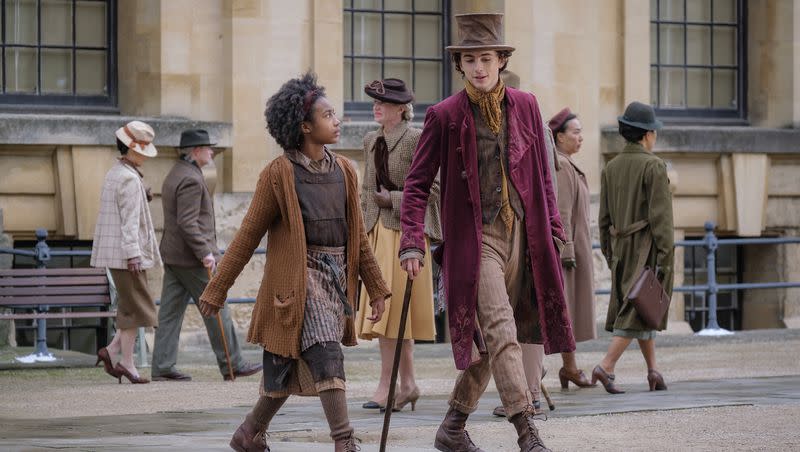Review: ‘Wonka’ may be the most surprising movie of the year

- Oops!Something went wrong.Please try again later.
- Oops!Something went wrong.Please try again later.
- Oops!Something went wrong.Please try again later.
I believe one of the bravest things a person can do is admit when they were wrong. So marvel at my courage, please, for what I’m about to do.
Admit that the “Wonka” movie is great.
Like many, I scoffed when I first saw the trailer. Who asked for a “Charlie and the Chocolate Factory” prequel, I wondered. Why are we constantly dipping into the well of the same intellectual properties instead of creating new characters and stories? And whose harebrained idea was it to involve Timothée Chalamet?
Chalamet is best known for surly and misunderstood characters often played with a forceful undercurrent of irony — AND for dating a Kardashian. Casting him as Willy Wonka seemed like a serious mistake. But actually, much of the success of “Wonka” can be attributed to Chalamet’s surprising and uncharacteristic turn as a magical man with a complete lack of guile.
Chalamet is wide-eyed and earnest throughout the entire run time. But he’s not naive. His performance captures some of the unpredictability and fire behind the eyes of Gene Wilder’s Wonka portrayal in “Willy Wonka and the Chocolate Factory.” He zigs when you think he’s going to zag. He talks quickly and always seems one step ahead of every other character and the viewer.
He also has a pretty decent singing voice, or at least not an outright bad one, which suits the simple melodies of the movie’s musical numbers.
Related
I should have known better than to doubt Paul King, the director of “Paddington” and “Paddington 2,” the latter of which remains one of the best films I’ve ever seen.
Much like in “Paddington 2,” in “Wonka,” King creates a whimsical, gentle and entirely wholesome world where every frame looks like a page from a beloved picture book. The sets, the colors, the score and the costumes create an environment that feels both magical and safe.
Knowing the end from the beginning — this movie is a prequel, after all — and knowing that Willy Wonka will ultimately succeed in building his chocolate empire makes the viewing experience feel less like a thrill ride and more like a comforting stroll.
The stakes of the movie never really go beyond whether Wonka will succeed as a chocolatier, and while there are a few scenes meant to suggest that other established chocolatiers would like Wonka dead, it never feels like anything more serious than Wile E. Coyote setting up another bunch of dynamite for the roadrunner to collide with.
The movie's villains are Matt Lucas, Paterson Joseph and Mathew Baynton as the rival chocolatiers, Olivia Colman as the hotel proprietor who imprisons her guests, Keegan-Michael Key as a corrupt chief of police with a crippling chocolate addiction, and Rowan Atkinson as a bishop who protects a secret chocolate lair. They are all are cartoonish and played in such a way that suggests the actors had the time of their lives on set. Which makes for very enjoyable viewing.
One person who was clearly miserable, however, is Hugh Grant, who plays an Oompa Loompa and said of the experience at a press conference, “I could not have hated the whole thing more.” But his visible disdain actually enhances the performance. At the same press conference, King described Oompa Loompas as sarcastic, judgmental and cruel, based on Roald Dahl’s descriptions of them in “Charlie and the Chocolate Factory.”
“Wonka” is not a perfect film. Its two-hour run time is a bit too long, especially for kids. There’s a little too much reliance on a child actor to carry the story, and a few unnecessary plot complications.
But King pulls off an ending so moving that I found myself wiping tears away at a matinee showing. It’s a conclusion that both reinforces the movie’s core message: that it’s relationships and not products that ultimately matter, which paves the way for the older Willy Wonka at the center of the 1971 film without shadowing Wilder’s beloved and iconic performance.
There’s perhaps no greater endorsement of this film than that of my children, who saw it with me for their second time because they enjoyed it so much the first.
I am happy to report that I was wrong when I initially thought the movie would fail. “Wonka” is warm and surprising, the perfect family movie for this holiday season.

